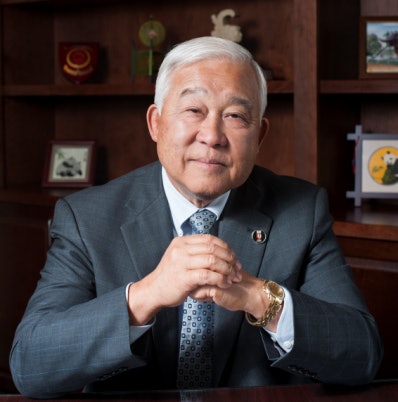 Dr. Roy Saigo (photo courtesy of Southern Oregon University)
Dr. Roy Saigo (photo courtesy of Southern Oregon University)After seven years in retirement from academia, Dr. Roy Saigo became president of Southern Oregon University in July 2014. In just over a year, an institution that once starved for funding and resources has seen tremendous growth, shares its leader.
“We turned enrollment around, we increased retention from 68 percent to 75 percent and this year we have 400 more applications than we had a year ago,” says Saigo.
Saigo began his career in higher education in 1967 as a biology professor at the University of Wisconsin–Eau Claire. He climbed the ranks and became assistant dean of the College of Arts and Sciences at UW–Eau Claire.
In 1984, he began serving as dean of the College of Natural Sciences at the University of Northern Iowa and, in 1990, began his tenure as provost and vice president for academic and student affairs at Southeastern Louisiana University.
Throughout his career, Saigo has worked to increase student enrollment while adding diversity to student bodies, he notes.
“I’d like to be confident that we have educated more students and that they are going to make a difference in society,” he says. “From my own personal experience, affordable public education is the one sword that will help you help yourself, your family and society.”
In order to grow enrollment numbers and university resources, Saigo finds success in “building relationships and developing trust and respect,” he says.
In 1994, as chancellor at Auburn University at Montgomery (AUM), he partnered with local high schools. “I remember going to Carver High School on the south side of Montgomery — they are about 95 percent African-American — and meeting with the principal. I basically said, ‘I want you to know that your children are welcome to come to AUM,’” Saigo recalls.
“He leaned back in his chair, put his hands together and closed his eyes … [then] he leaned forward, looked at me straight ahead and said, ‘You know Dr. Saigo, I’ve been principal for 19 years and you are the first president of any university — Black or White — to ever visit me.’ And their students started coming to our institution and we took the minority population way up.”
Saigo then served as president of St. Cloud State University in Minnesota from 2000 to 2007, in which time the campus grew to approximately 16,000 students and 175 majors and minors, becoming the most highly enrolled university in the Minnesota State Colleges and Universities system.
As a first-generation American born to working-class Japanese immigrants, Saigo’s dedication to providing opportunities for minorities comes from a very personal place. As a child, Saigo was one of approximately 120,000 other Japanese Americans who were removed from their homes and confined to internment camps during World War II.
From Sacramento, California, he was taken to the Gila River Relocation Camp in Arizona for nearly three years. When he was released, he was 5 years old. His family settled in Elk Grove, California, and worked as farmers.
“When we came out of the camp, we were considered the enemy because of how we looked. We raised fruit for a man because we couldn’t own property. I threw silage for cows and we raised pears and peaches,” says Saigo. “Oftentimes, my father said, ‘If you don’t like this, you need to go and get an education because that’s one thing they can’t take away from you.’”
He went on to earn a bachelor’s in biological science at the University of California, Davis in 1962 and completed postgraduate studies in agriculture in 1963. He then earned a doctorate in botany and plant pathology at Oregon State University in 1969, and, in 1984, he completed the College Management Program at Carnegie Mellon University.
At Southern Oregon, Saigo has prioritized the diversification of the institution’s faculty and administration.
“We are purposefully looking at ways in which we are going to start diversifying search committees and also requiring each search to bring in minority candidates,” he says. “People don’t like change, but this is the future of Southern Oregon, and, if we don’t change with the times, we are not going to exist.”
Thus far, the institution has hired and appointed multiple well-qualified people of color and those who identify as LGBTQ to key administrative positions at Southern Oregon.
“We need to smooth the road for everybody because the path is more difficult for some than others,” says Saigo. “We need to broaden our eyesight to wear glasses of many different colors, and, if we don’t do that, we are not doing American society any good, we are not doing our democracy any good and we are not helping the middle class achieve what it can.”


















